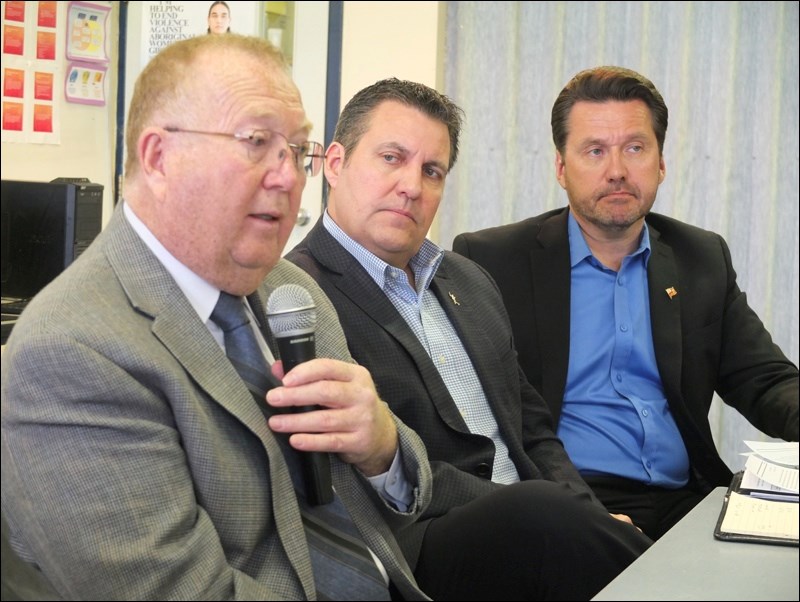More mining activity and economic diversification, less red tape and Winnipeg favouritism.
That was what a delegation of Official Opposition politicians touted Tuesday in a bid to turn Flin Flon Tory blue for the first time in decades.
“We know very much that when we have a strong north, we have a strong province,” said Ralph Eichler, one of three Progressive Conservative MLAs to address the Flin Flon and District Chamber of Commerce.
Eichler said his party has repeatedly heard about the concept of better utilizing the Port of Churchill and turning Flin Flon into a loading hub for shipments headed to the port.
Leslie Beck, a Flin Flon city councillor in attendance, asked for the Tories’ position on a potential road linking Manitoba and Nunavut.
Based on her experiences with the government, Beck fears the NDP has already settled on a route through Thompson rather than Flin Flon.
The PCs would undertake a consultation process and consider finances before making a decision, Eichler told Beck and 20-plus guests at the Friendship Centre Restaurant.
Capitalize
Cliff Cullen, the party’s mineral resources critic, said more must be done to capitalize on northern Manitoba’s mining opportunities.
“We know we have some of the world’s best resources here in northern Manitoba,” Cullen said, “and we want to make sure that, as a government, we’re there to facilitate development in northern Manitoba.”
Cullen said mineral exploration across Manitoba totalled $25 million in 2014, down from $140 million in 2011. At the same time, Manitoba’s share of exploration dollars spent in Canada declined.
He called those figures “quite dismal” and said much of it stems from red tape and provincial policies.
“We as a province are competing [for] investment money against every other jurisdiction in Canada and around the world,” Cullen said. “So we have to do what we can as government to make sure that we’re competitive and that investors, people like Hudbay, are willing to invest their money in Manitoba.”
Cullen said Manitoba also lacks “a real policy” regarding the duty to consult with First Nations on mineral projects, meaning “permitting applications aren’t getting done.”
As vital as mining is, many northerners favour a more varied economic approach. To that end, Laurence Gillespie asked whether the PCs would let Flin Flon access existing provincial dollars for mining community diversification.
Gillespie said it’s his understanding that Flin Flon has had difficulty securing those dollars.
Cullen said the government has “been pretty closed on that particular fund” so the PCs “want to dig around a little bit” to see how the money is being spent.
The intent of the fund, Cullen said, was to help communities in the event of a mining closure. He hopes that doesn’t happen in Flin Flon but said there is an opportunity to see if funding can be accessed without a closure occuring.
Further to mining, Cullen described the NDP’s proposed polar bear provincial park in dire terms, saying it “could encompass a very large part of northern Manitoba.”
“Unless we have an open discussion about what that park looks like, the conversation could be behind closed doors and before we know it, we could have a park all over northern Manitoba,” he said, “and that would stop any further development.”
According to the province, the polar bear park would be established around the west and south sides of Hudson’s Bay. No final decision on the park has been reached.
Arts funding
Another question Tuesday came from Mark Kolt, a prominent figure in Flin Flon’s arts community.
Kolt said the Manitoba cultural scene seems fixated on Winnipeg, with cultural grants practically impossible to obtain for projects outside of that city.
Doyle Piwniuk, the PC culture critic, said his party wants to represent all of Manitoba, not just Winnipeg, so those funds would be distributed equally.
“We have culture throughout the whole province. That includes Flin Flon,” said Piwniuk.
In terms of neighbourhood renewal grants made available by the NDP, Piwniuk agreed there should be “some incentives” to beautify and renew neighbourhoods in Flin Flon and elsewhere.
At one point Cullen was asked whether the PCs would allow the movement of nuclear waste through Manitoba should Creighton become a storage site for the radioactive material.
While he said his party has not really discussed the issue, it may be a moot point: the federal government, not provinces or municipalities, has the final say on the transport of goods.
Cullen said the concept of nuclear waste storage will spark “quite a discussion within the community” and that his party is eager to hear what residents have to say.
“And we’ll certainly take some guidance from that, I’m sure,” he said.
Asked whether the Tories’ plans include the new Flin Flon ER already announced by the NDP, Eichler said his party is “very much in favour” of that project.
Tom Therien, president of the chamber, said the Tory MLAs’ appearance at Tuesday’s meeting does not amount to an endorsement by the chamber. Other parties are also welcome to speak.
The PCs have not held the Flin Flon provincial constituency since 1969. The next provincial election is anticipated in April 2016.




